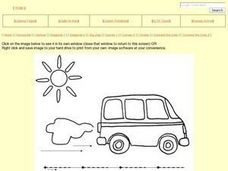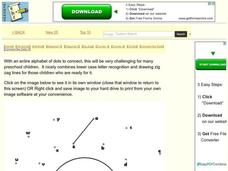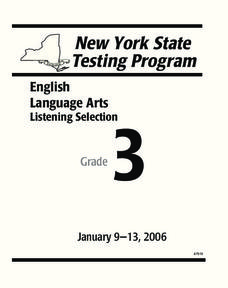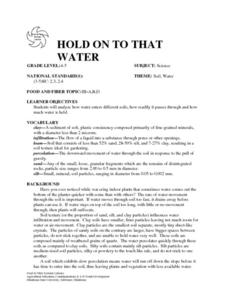Curated OER
Life Cycle of Frogs
In this frogs worksheet, students analyze and color a diagram of the life cycle of frogs from egg to tadpole to full-grown frog.
Curated OER
Northern Leopard Frog
In this frog anatomy worksheet, students use the 7 body part names to correctly label a diagram of the Northern Leopard Frog. Students read the information paragraph about the frog.
Curated OER
My Frog Book
In this frogs learning exercise, learners cut out, color, fold and assemble a 4 page mini book about frogs. Students write what they know, have learned, and want to know about frogs.
Curated OER
List Frog Facts
In this frogs worksheet, students study and color a picture of a frog. On the blank lines below the picture, students write some of the things they have learned about frogs.
Curated OER
Tracing Exercise
In this tracing worksheet, students prepare to learn to print by tracing 20 straight dotted lines from left to right. Students then color a picture of a bus.
Curated OER
Tracing Practice
In this writing learning exercise, students trace the letter from the top dot to the bottom line. This learning exercise provides room for students to try and write the letters without dots. There is a picture to color as well.
Curated OER
Tracing Practice
In this tracing worksheet, students trace 14 dotted examples of a curved line. Students color the large picture of the smiling face.
Curated OER
Drawing Straight Lines
In this pre-printing practice worksheet, students use straight lines to connect a set of dots, then color the resulting picture. Page has multiple links to additional resources.
Curated OER
Tracing and Coloring Practice
In this pre-printing worksheet, students trace the straight and curved lines in a large picture of a barn. Students color the picture any way they like.
Curated OER
Xeriscaping In Your Community
Fourth graders participate in a service-learning project to design landscaping that maximizes water use and utilizes indigenous plant species.
Curated OER
Dishing the Dirt Part 3
Young scholars collect and examine different soil samples. They test for specific types of soil elements and the pH level. They answer questions about optimum growing conditions as well.
Curated OER
From Caterpiller to Butterfly: Cycles, Circles, and Patterns
Students examine art of butterflies and discuss what they know about the insect. They create their own butterfly puppets and write a story to represent its life cycle.
Curated OER
Weeds on the Windowsill
Students study farming and reasons to control weeds. They examine pesticides necessary for the control of weeds and the damage to the environment. Through experimentation, students plant seeds in different soils and determine if seeds...
Curated OER
Cause and Effect
In this cause and effect worksheet, students read the descriptions and determine the cause and effect for each example. Students select the correct word to complete the 5 examples.
Curated OER
Thinning and Transplanting
Students identify and observe one plant per section in their quad and to transplant the surplus seedlings to empty quads and interpret why this is important. They then discuss the purpose of thinning and transplanting. Finally, students...
Curated OER
Show Me The Dinos
Students explore a site of numerous fossil excavations. Using an interactive quarry map, they locate dinosaur specimens and individual bones. In groups, students use "Show Me" cards to answer questions, compile information, and create...
Curated OER
New York State Testing Program: English/Language Arts Listening Selection, Grade 3
In this 3rd grade English/Language Arts standardized test practice learning exercise, students listen to a fictional story that as their instructor reads it aloud 2 times. No questions accompany the learning exercise.
Curated OER
IN STRAWBERRY FIELDS
The student will calculate wages of agricultural workers by the hour and by the piece.2. Share background material, and discuss the difference between gross pay and net pay and the difference between getting paid by the hour or the piece...
Curated OER
Birth, Growth, And Development
Young scholars understand that all living things have a life cycle that includes being born, developing into an adult, reproducing, and eventually dying.
Curated OER
Butterfly
Students use a purchased kit to explore the characteristics and life cycles of several butterflies including the Monarch, Western Swallowtail, Red Admiral and Painted Lady. They create a plaster casting of each species for study and...
Curated OER
SEEDS WE EAT
Students identify seeds humans eat and do not eat. Students make seed collections, using common kitchen foods. Students display seeds from the foods they serve and discuss them with their guests. Students complete activities which...
Curated OER
Vegetable Twister
Pupils review vegetables and their nutrient values and production. In this vegetable production worksheet, students read information about the nutrients in vegetables and how they are grown. Pupils participate in a game of Twister to...
Curated OER
Desert Xeriscaping
Students recognize native species of desert vegetation while examining the need for water conservation. They design and create a xeriscape landscape using a variety of materials.
Curated OER
HOLD ON TO THAT
Young scholars will analyze how water enters different soils, how readily it passes through and how much water is held.1. Materials needed for the activity are; pint of clay, pint of sand, pint of loam, newspaper,
three frozen fruit...

























